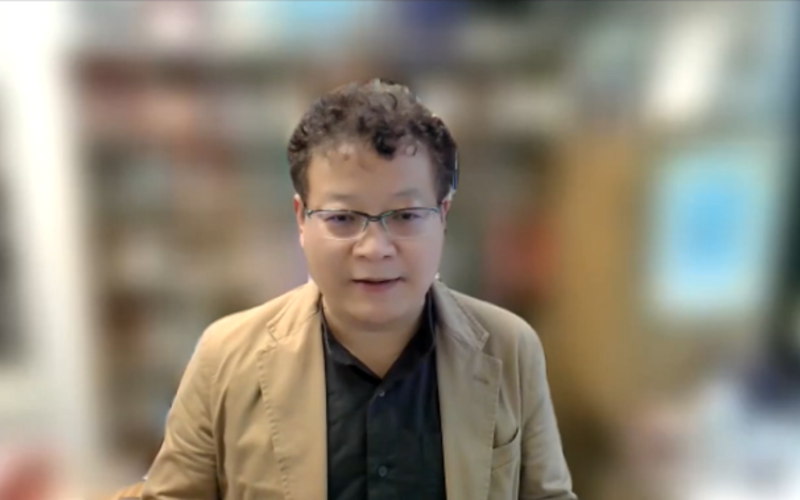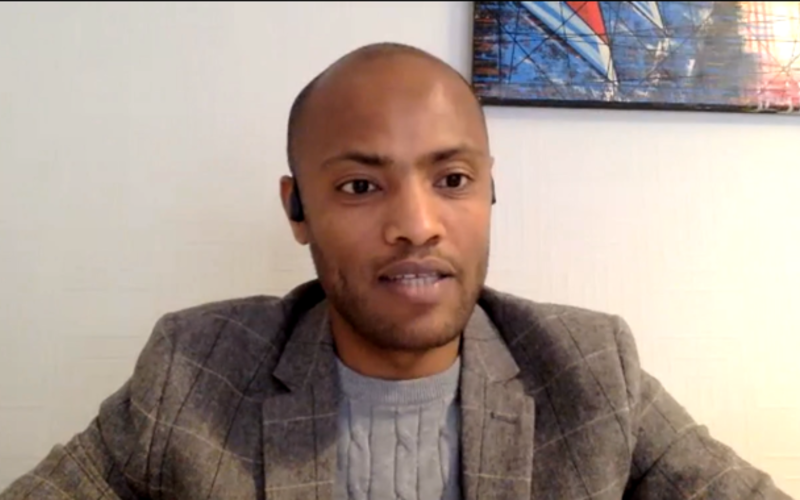Latest News
HKCML & CCCL Organized Online Conference on Addressing Climate Change in the Post-pandemic Era: A Global Perspective
Climate change is a significant environmental risk threatening the social, economic, and environmental sustainability of all states. Reduced resilience and reduced diversification of developing states’ economies make them far more vulnerable to climate change risks.
On 30 November 2022, Hong Kong Commercial and Maritime Law Centre (HKCML) in partnership with the Centre for Chinese and Comparative Law (CCCL), hosted an online conference entitled “Addressing Climate Change in the Post-pandemic Era: A Global Perspective”. The conference included contributions on examining the problems decarbonization and energy transition pose and the ways efforts to optimize each sectoral approach can be coordinated and made more efficient. The discussion took place over four panels, each providing an insightful analysis of such questions and potential solutions to pressing problems.
The Conference started with welcome remarks by Prof. Alexander LOKE (Director of HKCML) and Prof. Jiangyu WANG (Director of CCCL). They welcomed all participants and thanked the speakers for discussing their ideas. The conference organizers Dr. Meng Mandy FANG (Assistant Professor, City University of Hong Kong School of Law) and Prof. Michael TSIMPLIS (Professor, City University of Hong Kong School of Law) then explained the background and objectives of the conference, hoping the conference would promote and have a substantial impact on legal and policy developments.
The first panel – “Climate Change and Energy Transition” was moderated by Dr. Dong LIANG (Assistant Professor, City University School of Energy and Environment). There were two speakers in this panel. Dr. Philip Andrew SPSEED (Energy Studies Institute, National University of Singapore) spoke on “Understanding the Heterogeneity of National Responses to the Low-carbon Energy Challenge”; and Dr. Hao ZHANG (The Chinese University Faculty of Law) gave a presentation on “China’s Carbon Neutrality Objective: Legal and Regulatory Arrangements Governing the Network-dependent Energy Industry”. Dr. SPEED explained the IPCC 6th Assessment Report to argue the structural factors including resource endowment, political system and ideas, values, and beliefs. He believed those factors could endure the difficulties for developing countries. Dr. ZHANG first provided his analysis of China’s carbon neutrality objective and contended that the current institutional arrangement in China’s energy governance depends on the NDRC and NEA to carry out more active roles as regulators.
The second panel, moderated by Dr. Mandy FANG, was entitled “Climate Change and International Shipping” with two presentations. Prof. Michael TSIMPLIS discussed “Institutional obstacles in the decarbonization of international trade: The case of the IMO”; and Dr. Regina ASARIOTIS (Policy and Legislation Section, Division on Technology and Logistics, Policy and Legislation Section, United Nations Conference on Trade and Development) spoke on “Climate change adaptation for ports. A priority issue for developing countries”. Prof. TSIMPLIS provided some international shipping facts and figures to the audience to introduce his topic. Dr. ASARIOTIS suggested some actions needed to ensure that 2030 critical transport infrastructure is climate resilient 2050, which will remain the key to achieving progress on many SDGs. She argued that we needed to improve data collection, plan early, adopt a systematic approach and avoid maladaptation or over-engineering from now on.
The third panel - “Climate Change and International Trade” was moderated by Prof. Virginia HARPER HO (City University of Hong Kong School of Law) and consisted of two presentations. Dr. Meng Mandy FANG spoke on “When Decarbonization Meets Industrialization: The First WTO Dispute Between the EU and UK” and Dr. Hanok ASMELASH (Birmingham Law School) presented on “The Regulation of Environmentally Harmful Fossil Fuel Subsidies: From Obscurity to Prominence in the Multilateral Trading System”. Dr. FANG provided Measures relating to the allocation of contracts for differences in low carbon energy generation in the United Kingdom (UK-CfD (EU)) as background information. She suggested that not all forms of policy instruments blending decarbonization and industrialization would fail WTO’s scrutiny. Therefore, in the UK’s case, it is significant to identify the factors hindering the competitiveness of the country’s lack of competitiveness in the offshore wind manufacturing industry and design solutions. Dr. ASMELASH first focused on explaining the energy subsidies in almost all countries around the world and pointed out the intergovernmental efforts to reform fossil fuel subsidies from 1992 to 2021. He argued there were a few challenges ahead, including defining fossil fuel subsidies, targeting harmful fossil fuel subsidies, enhancing transparency, and ensuring inclusivity.
The last panel - “Climate Change and Investment” was moderated by Prof. Michael TSIMPLIS. Prof. Virginia HARPER HO spoke on “Corporate Climate Disclosure Mandates: Implications for Corporate Governance (and the Planet)”. Prof. HARPER HO explained the corporate climate disclosure mandates at first. She explained not only the implications for corporate governance but also the impacts and limitations of a post-carbon transition.
The seven presentations delivered during the four panels were informative and thought-provoking, and the group discussions following each panel's presentations were equally impressive. Insightful comments and questions were raised after each presentation which promoted further interactions between speakers and the audience.
氣候變化是現世代各國主要面對的環境風險,不但威脅著所有國家的社會、經濟,更危及環境可持續性。當中,尤其因發展中國家的復原力下不足及低水平的經濟多樣化程度,使它們更容易受到氣候變化風險的影響。
香港城市大學法律學院屬下的香港商務及海事法研究中心(HKCML)和中國法與比較法研究中心 (CCCL) 於2022年11月30日聯合協辦了一場網上研討會,以全球視角來探討及應對後大流行時代的氣候變化。本次會議邀請了7位來自世界各地的專家學者,目的是為專家學者們提供一個強大且中肯的平台展開相關的學術討論。會議內容包括研究去碳化和能源轉型帶來的問題,及如何協調和更有效地優化每個部門的努力。討論分四個小組進行,每個小組都對這些問題以及對緊迫問題的潛在補救措施進行了深刻的分析。
本次會議首先由CCCL主任王江雨教授及HKCML主任Alexander LOKE教授致開幕辭揭開序幕。他們歡迎各位與會者參與會議。隨後則由會議發起人方萌博士(香港城市大學法學院助理教授)和Michael TSIMPLIS教授(香港城市大學法學院)為各位簡介了本次會議的背景和目的,並希望會議能夠促進法律和政策的發展並產生實質性影響。之後,本次會議的四個環節順序展開。
第一節由董亮博士(城市大學能源與環境學院助理教授)主持,主題為「氣候變化與能源轉型」。本環節的講者分別為:Philip Andrew SPSEED博士(新加坡國立大學能源研究所高級首席研究員)及張浩博士(中文大學法學院助理教授)。SPEED博士的發言題目是「分析各國對低碳能源挑戰的不同反應」,他先以IPCC第六次評估報告引入,並指出其結構性因素包括資源禀賦、政治制度和思想、價值觀和信仰,而這些因素可能會為發展中國家帶來阻礙。而張博士題為「中國的碳中性目標」,他先分析中國的碳中和目標亦即中國的能源部門的發展目標。他亦指出目前中國能源治理的體制安排,將取決於國家發改委和國家能源局能否作為監管機構在未來發揮更積極的作用。
第二節主題為「氣候變化與國際航運」,由 方萌博士主持,並由Michael TSIMPLIS教授和Regina ASARIOTIS博士(聯合國貿易和發展會議(貿發會議)政策和立法科技術和物流科科長)演講。因Michael TSIMPLIS教授以「國際海事組織的案例:國際貿易去碳化中的體制障礙」為題,因此向聽眾提供了一些國際航運的事實和數字分析來作深入講解。ASARIOTIS博士的主題為「港口如何適應氣候變化」,她提出了一些需要採取的行動,以確保2030年關鍵的運輸基礎設施在2050年具有氣候適應性,這仍將是未來實現許多可持續發展目標進展的關鍵。她認為,我們需要改進數據收集,儘早計劃,並採用系統方法,及從現在開始避免適應不良或過度工程。
第三個主題為「氣候變化與國際貿易」,由Virginia HARPER HO教授(香港城市大學法學院教授)主持,並由方萌博士及Hanok ASMELASH博士(伯明翰法學院助理教授)演講。方萌博士的演講題目是「當去碳化遇到工業化」,她先提供了與英國低碳能源發電差異合同分配有關的措施(UK-CFD(EU))作為背景資料。她在最後表示,並非所有形式的融合了去碳化和工業化的政策工具都不能通過WTO的審查,而就英國的情況而言,該國在海上風電製造業和設計方案方面缺乏競爭力等等因素,對未來環境政策可能產生一定阻礙。而ASMELASH博士的主題為「對環境有害的化石燃料補貼的監管」,他首先重點解釋了世界上幾乎所有國家的能源補貼問題,並指出了1992年至2021年各國政府間為改革化石燃料補貼所做的努力。他認為,監管在未來的道路上仍然有不少挑戰,包括定義化石燃料補貼、如何針對有害的化石燃料補貼、提高透明度以及確保包容性。
會議的最後一個主題為「氣候變化與投資」,由Michael TSIMPLIS教授主持,並由Virginia HARPER HO教授演講。她以「企業氣候披露任務:對企業治理(和地球)的影響」為題,解釋了企業對氣候信息披露的任務。她不僅解釋了對公司治理的影響,亦講出了後碳轉型的影響和局限。由於健康問題,Aikaterini FLOROU博士(利物浦大學法律和社會正義學院助理教授)很可惜無法出席此次會議,她原定的演講主題是「能源社區作為公正能源轉型的催化劑:公私合作的作用」。
講者們在四個環節發表的合共七節既具資訊性又發人深省的演講固然精彩,但與會者於每個環節所有講者發言後的集體討論時間中提出的問題和意見的質素同樣很高,當中不乏對演講內容的具建設性批判、獨到且具啟發性的見解,以及對講者及全體與會者的尖銳提問,引發大家更深入的討論。
為時長達近五個小時的網上會議,最後以本次會議發起人方萌博士和Michael TSIMPLIS教授的閉幕辭結束。兩位主辦方代表再次感謝各位與會者於百忙中抽空參與會議,特別感謝各位講者在會議上發表的寶貴意見。



















